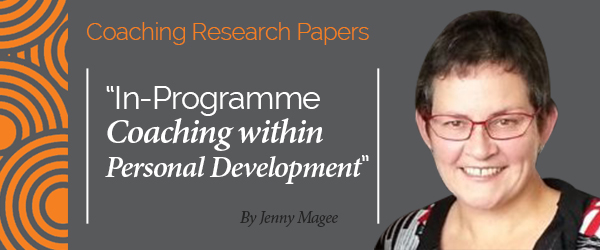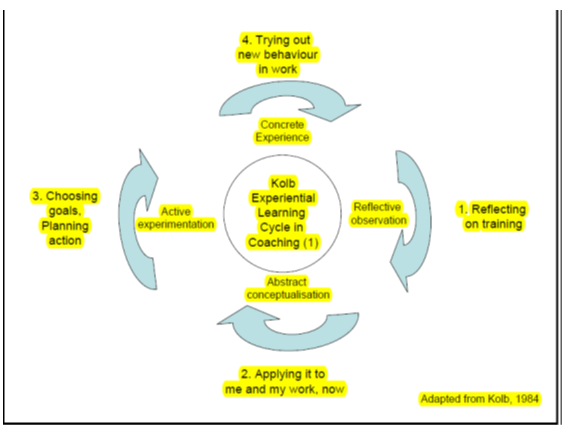Research Paper By Jenny Magee
(Executive Coach, NEW ZEALAND)
Case Study:
Most coaches work independently with clients, one-to-one, or in groups, with the focus of deepening self-awareness and taking action. The coach’s role is very different from a trainer, whose focus is on the delivery and management of process and content to the group.
As a trainer of many years and a coach for the past five, I have become interested including coaching within a training programme. The impetus for this came about as my business partner and I decided to turn our passion for personal development into a programme for women. With our respective skills and delivery strengths, it was an easy step to consider embedding the individual focus of coaching within group focused training. A literature search revealed much discussion about coaching in terms of transfer of learning, but very little relating to a dual practitioner approach. While it is evidently not common practice, we felt the potential benefits for participants could be substantial.
This case study seeks to answer key questions underpinning the validity of an in-programme coaching model, to draw on the limited available research, and to note our observations of the process thus far. We describe our format as involving ‘coaching moments’, reflecting the spontaneous and responsive nature of coaching within a training programme.
How does coaching add value to training?
The purpose of training is generally to impart knowledge and develop skills, usually in a group setting. The focus is on building capability to execute new or improved performance.
While training has a broad perspective, coaching focuses on the individual. John Whitmore (2007) describes coaching as ‘unblocking a person’s potential to maximise their own performance. It is helping them to learn, rather than teaching them.’
Coaching often follows training, as part of a process to embed, or ‘transfer’ the learning. Olivero, Bane et al. described the extent to which a trainee receives the opportunity for practice and constructive feedback as a critical factor influencing the transfer of training, suggesting that one-one-one coaching can provide this. A safe, personalised environment in which practice and feedback can take place is essential.
How does learning theory validate in-programme coaching?
Neuroscience reminds us that the brain, specifically the pre-frontal cortex, loves novelty. With a variety of approaches, training participants experience higher engagement in learning and remember things more easily. In order to embed that learning, we need to repeat the learning in as ways as possible. Providing in-programme coaching both deepens and personalises the experience for the learner. By dealing with individual’s issues as they arise in the workshop, we can support them to focus on the bigger picture. Coaching moments can be a bit like diving down rabbit-holes, but ignoring the issues risks that the participant will remain sidetracked.
Coaching, as a discipline, is informed by theories of learning, change, human development and adult learning. In-programme coaching resonates strongly with the key principles of adult learning. These reinforce both group and individual approaches, as adults seek active learning that specifically meets their needs and validates their experience.
Principles of Adult Learning
- Adults must want to learn. They will only learn when they are internally motivated to do so.
- We often come to coaching at times of transition, stepping back to take a different view of our lives when dissatisfaction or circumstances push us to do so.
- Adults will only learn what they feel they need to learn. All programmes need to have practical application. We often know what we’re supposed to do, but not always how to do so. Training provides the how-to, while coaching embeds the action.
- Adults learn by doing. Active participation keeps us engaged and builds on what we already know.
- 4. Adult learning is problem-based and these problems must be realistic. Adult learners like finding solutions to problems. Discussions with fellow participants and the coach help them to see their issues in perspective.
- Adult learning is affected by the experience each adult brings. Coaches believe we are experts in our own lives.
- Adults learn best informally. Adults learn what they feel they need to know choosing what is most relevant to their needs.
- Adults want guidance. Adults want information that will help them improve their situation. Coaching helps them to find their own solutions.
- Adults require a variety of teaching methods. The skill of the trainer plus the skill of the coach in designing and delivering a well designed programme is essential.
Also useful in explaining the effects of coaching in training, is a version of Kolb’s (1984) explanation of experiential learning, described by Linda Spencer in an article Coaching and training transfer: A phenomenological inquiry into combined training-coaching programmes. Kolb argued that adult learning requires a cycle that passes through the phases of concrete experience, observational reflection, abstract conceptualisation and active experimentation. Spencer writes that ‘both training and coaching reflect this cycle, and the combination (particularly when the coaching expressly builds on training) provides an opportunity for repeated turns of this cycle to produce a learning spiral.’

